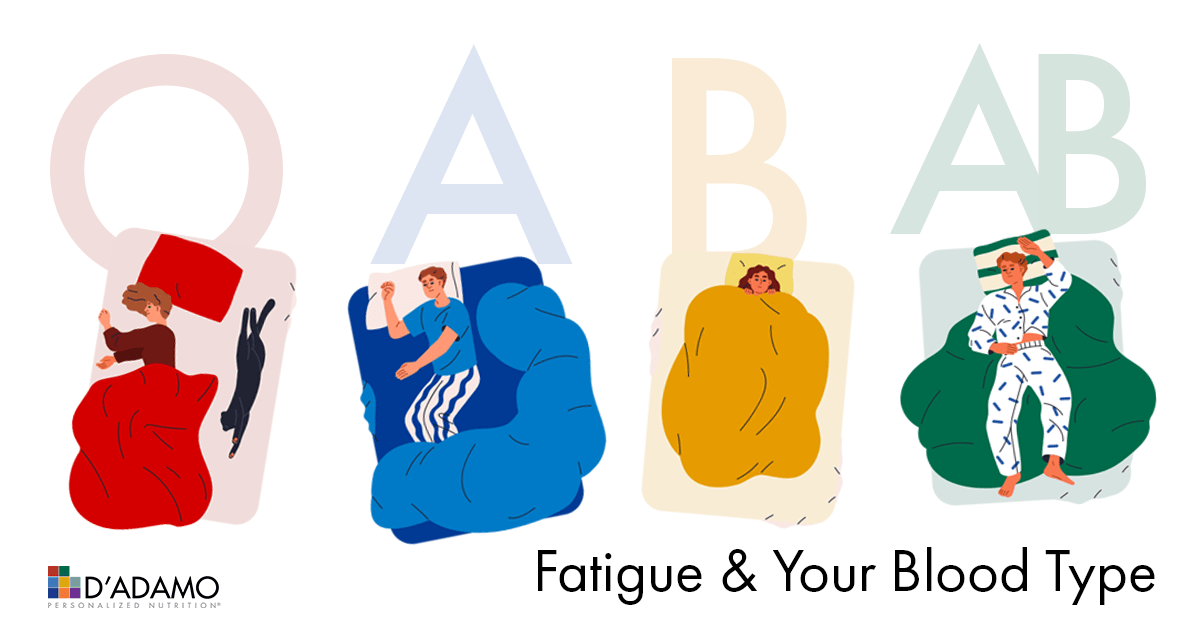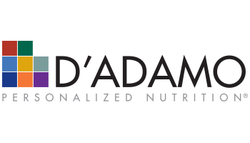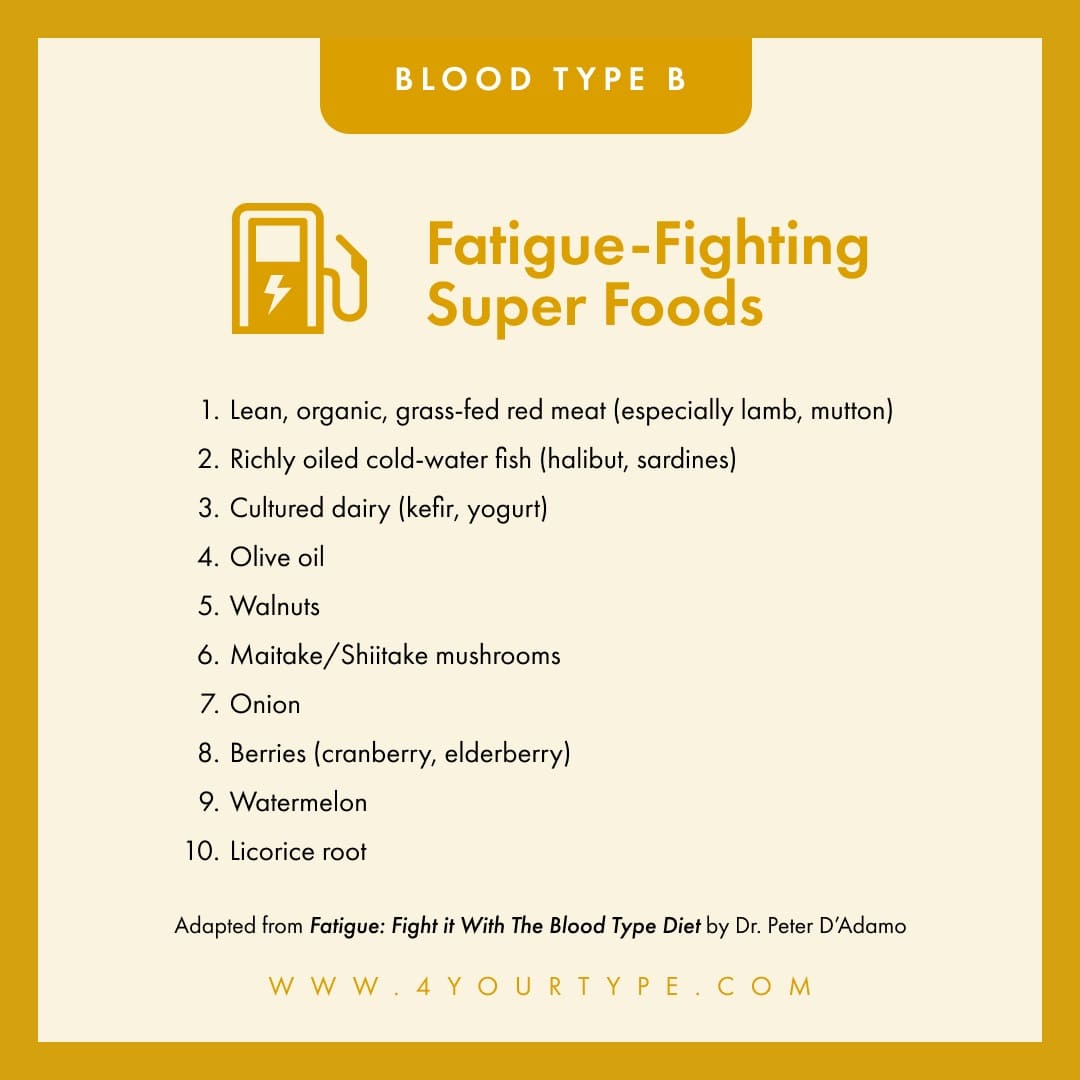
Find natural ways to boost energy based on your blood type.
Everyone gets tired sometimes, but fatigue is much more than that. Many different things can cause fatigue; among them are immune system malfunction, stress, and toxicity.
The immune system destroys harmful things like bacteria and viruses while protecting its own cells. Chemicals called antigens are often found on the outside of cells, and the body uses these to help tell the cells apart. Normally, the body creates antibodies to foreign cells. Auto-immune diseases occur when the body gets confused and treats its own cells like invaders.
How does blood type affect energy levels?
Red blood cells have antigens, and these vary by blood type. People with O blood create antibodies to the A and B antigens, As create B antibodies, Bs create A antibodies, and ABs don't create basic blood type antibodies at all, since they have the A and the B antigen on their cells.
Because Os have more natural antibodies than other types, the immune system is "primed" to react to more things. They are more likely to get auto-immune conditions. Type As are most vulnerable to immune system depletion, getting sick more often. Type Bs are more prone to viral infections, including slow-growing ones that lead to autoimmune conditions. They're most susceptible to influenza and urinary tract infections.Type ABs have the weaknesses of As and Bs.
Our bodies are designed to handle short bursts of stress, but chronic stress can cause health problems and fatigue. Our stress response system has two basic parts; one to put the body into "stress mode" and the other to return the body to rest. The time at rest is important for proper digestion, healing, and normal cell repair. Adrenaline is designed for short-term stress response, while cortisol is used for the medium-term.
Type Os tend to secrete higher levels of adrenaline in response to stress, but have a harder time clearing it away later. Exercise helps the type O body "burn off" the extra adrenaline, restoring calm to the body. Type ABs also produce high levels of adrenaline.
Type A people have higher levels of cortisol all the time. Both As and Bs produce high amounts of cortisol in response to stress. Sustained high cortisol levels destroy healthy muscle and bone, slows down healing, impairs digestion, metabolism, and mental function. Producing all that cortisol also uses up the building blocks for other hormones, leading to various endocrine problems. Type Bs respond well to meditation and visualization, while As respond to these in a less efficient manner. As need to focus on calming exercises, minimizing the cortisol spike in the first place.
Cells create energy from oxygen and food, storing it as ATP. Molecules called second messengers tell the cells when to release ATP. Stress hormones cause more of these messengers to be active, calling for more ATP to be released at once. When the cells keep being told to release energy faster than they can make it, they stop responding as well. This leads to less energy being released from cells at all times. Less cellular energy means more fatigue.
Normal metabolism produces cellular wastes, called endotoxins. Xenobiotics are foreign substances found inside the body, such as chemicals that are breathed in, or pesticide residues from foods. Dietary lectins can affect your body's ability to clear both natural and foreign toxins from the body, and this toxic buildup can lead to fatigue.
Lectins are natural proteins found in foods that react with blood type antigens. Since there are blood type antigens found in the digestive tract, dietary lectins can cause inflammation in the gut and affect digestion. Sluggish digestion can cause fatigue as less energy is drawn from food. Some lectins make it into the blood stream to cause problems elsewhere in the body. Lectins are very blood type specific; there are foods that are toxic for one blood type yet perfectly healthy for another.
Following the Blood Type Diet and exercise recommendations can relieve fatigue. You'll be cutting out harmful lectins that make your body less efficient, as well as foods you can't digest properly. Learning how to exercise "just right" is important too. Over exercising will cause cortisol levels to spike in As, increasing stress rather than relieving it. Meanwhile, Type Os tend to thrive on vigorous aerobic exercise, and Bs and ABs fall somewhere in between. Those coping with chronic fatigue need to start slowly and avoid over exertion, regardless of blood type.
For more information, you can refer to my book Fatigue: Fight It With the Blood Type Diet. A complete listing of the foods for the Blood Type Diet can also be found on the Type Base.
Top 10 Fatigue Fighting Super Foods for Each Type
[Click the images below to download]
Fatigue-Fighting Checklist by Blood Type
Blood Type O | Fatigue-Fighting Diet Checklist
- Eat small to moderate portions of high-quality, lean, organic, grass-fed meat several times a week for strength.
- Include regular portions of richly oiled cold-water fish.
- Consume little or no dairy foods.
- Eliminate wheat and wheat-based products from your diet.
- Limit your intake of beans principally to those that are BENEFICIAL.
- Eat lots of BENEFICIAL fruits and vegetables.
- Avoid stimulants found in caffeine (coffee, colas, etc.).
- Avoid coffee, but drink green tea every day.
Blood Type A | Fatigue-Fighting Diet Checklist
- Avoid or limit animal proteins.
- Derive your primary protein from plant foods with seafood used occasionally.
- Seafood should be primarily richly oiled cold-water fish.
- Include modest amounts of cultured dairy foods in your diet, but avoid fresh milk products.
- Don't overdo the grains, especially wheat-derived foods.
- Eat lots of BENEFICIAL fruits and vegetables, especially those high in antioxidants and fiber.
- Drink green tea every day for extra immune system benefits.
Blood Type B | Fatigue-Fighting Diet Checklist
- Eat small-to-moderate portions of high-quality, lean, organic meat (especially goat, lamb, and mutton) several times a week for strength, energy, and digestive health.
- Avoid chicken.
- Include regular portions of richly oiled cold-water fish.
- Regularly eat cultured dairy foods, such as yogurt and kefir, which are beneficial for digestive health.
- Eliminate wheat and corn from your diet.
- Eat lots of BENEFICIAL fruits and vegetables.
- If you need a daily dose of caffeine, replace coffee with green tea.
- Avoid foods that are Type B red flags, especially chicken, corn, buckwheat, peanuts, soy beans, lentils, potatoes, and tomatoes.
Blood Type AB | Fatigue-Fighting Diet Checklist
- Derive your protein primarily from sources other than red meat.
- Eliminate chicken from your diet.
- Eat soy foods and seafood as your primary protein.
- Include modest amounts of cultured dairy foods in your diet, but limit fresh milk products.
- Don't overdo the grains, especially wheat-derived foods. Avoid corn flour altogether.
- Eat lots of BENEFICIAL fruits and vegetables, especially those high in antioxidants and fiber.
- Avoid coffee, but drink two to three cups of green tea every day.
These checklists were excerpted from the Fatigue: Fight it with the Blood Type Diet book, where you can find other healthy tips and recipes that are right for your blood type.
Energy-Boosting Protein Drinks
Our bodies require the proper nutrients to function efficiently. Following your blood type specific diet provides maximum nutritional support to fight fatigue and support healthy energy levels. Here's an energy-boosting protein drink recipe adapted for each blood type.
This recipe was adapted from the Eat Right for Your Type Personalized Cookbooks series, where you can find delicious, healthy recipes that are right for your blood type.









